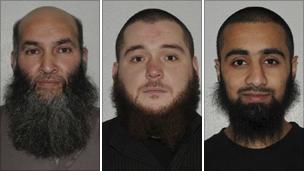Munir Farooqi given four life sentences for terror charges
- Published

The men were involved in a plot to try to radicalise two undercover officers to fight in Afghanistan
A former Taliban fighter has been given four life sentences after being found guilty of trying to recruit undercover officers to fight in Afghanistan.
Munir Farooqi, 54, from Longsight, Manchester, was convicted of preparing terror acts, soliciting to murder and disseminating terrorist literature.
Matthew Newton, 29, was found guilty of the same charges at Manchester Crown Court.
Israr Malik, 23, was convicted of two counts of soliciting to murder.
Malik, of Fallowfield, Manchester, was also found guilty of preparing for acts of terrorism.
Former British Army recruit Newton, of Stalybridge, was given six years and ordered to serve a minimum of three years before he is eligible for parole.
Malik was given an indeterminate sentence and will be considered for parole in five years, the judge said.
Farooqi was told he must serve a minimum of nine years before he can be considered for parole.
The three men had denied all charges.
'Low ebb'
Munir Farooqi's son, Harris, was acquitted of the charges but sat in the public gallery to hear his father's sentence.
The court was told Farooqi was a Pakistani-born British citizen at the centre of a plot to radicalise and persuade young men to "fight, kill and die" in a jihad in Afghanistan.
The father-of-three ran a Dawah or Islamic book stall on Longsight market in Manchester with the help of Newton and Malik where young men were offered extemist books and dvds.
In October 2008 the stall was approached separately by two undercover police officers, known only as Ray and Simon, who pretended to be at a low ebb in their lives and interested in Islam.
The court heard that the group would talk to the officers in code using the phrase going on "holiday" as the signal for talking about travelling to Afghanistan.
Farooqi bragged to the officers how he had fought with the Taliban and told them they could become "martyrs" for the jihad cause.
He also found "amusement" at the sight of the flag-draped coffins of fallen allied troops returning from Afghanistan, the court heard.
Passing sentence Mr Justice Richard Henriques said: "You are in my judgement a very dangerous man, an extremist, a fundamentalist with a determination to fight abroad."
'Religious duty'
After the verdict, Det Ch Sup Tony Porter, head of the North West Counter Terrorism Unit, (NWCTU) said: "This was an extremely challenging case, both to investigate and successfully prosecute at court, because we did not recover any blueprint, attack plan or endgame for these men.
"However, what we were able to prove was their ideology. These men were involved in an organised attempt in Manchester to recruit men to fight, kill and die in either Afghanistan or Pakistan by persuading them it was their religious duty.
"That is not an expression of religious freedom, but a concerted effort to prepare people to fight against our own forces abroad. In law, that is terrorism.
"Munir Farooqi was the leader. He used his Dawah stall to attract vulnerable people like Israr Malik, and then began to radicalise them, encouraging them to perform violent jihad abroad.
"The two undercover officers devoted more than a year of their lives to exposing this terrorist network, putting themselves in harm's way to build up enough evidence to convict these men."
Speaking after the sentencings, Rose-Marie Franton, of the Crown Prosecution Service (CPS), said: "A thorough and careful preparation of the evidence by Greater Manchester Police and the CPS included secretly recorded conversations by two undercover police officers which demonstrated how they were being groomed to fight abroad against coalition and British troops in Afghanistan.
"These conversations were played to the jury and the two undercover officers, who gave evidence in court from behind screens to protect their identities, also described to the court exactly how the defendants tried to persuade them to help with violent jihad."
- Published8 September 2011